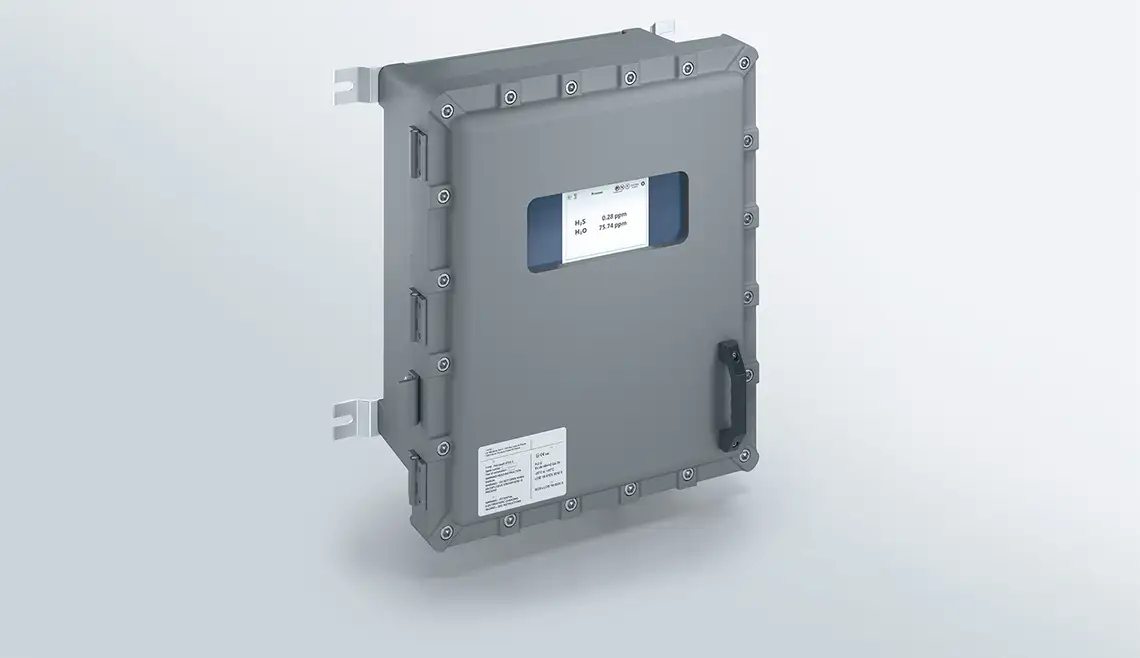
Gas analysis
DURAG GROUP gas analyzers are used in industry and research for a variety of different applications in continuous emission and process monitoring. Among other things, the analyzers can help to monitor and optimize production processes. They analyze whether a gas composition meets the specification or whether impurities are present. However, they can also be used to monitor ambient air and thus ensure safety in the workplace or to measure climate-relevant greenhouse gases.
Extractive measurement systems for gas analysis consist of a sampling system and an analyzer, which are designed differently depending on the measurement task. The sampling system consists of a probe that extracts the sample gas from the process and a sample gas line that transports the sample gas from the extraction point to the analyzer. The sampling system can be heated or unheated. The analyzer primarily includes a pump unit that conveys the sample gas, a measuring unit that determines the concentration of single or multiple gases, and an operating unit that offers controls and displays the measured concentration. In addition, further units for conditioning the sample gas, stabilizing the ambient temperature or for quality control of the measurements may be present in the analyzer. Depending on the design of the analyzer housing, installations in outdoor areas or in Ex zones are possible.
Multicomponent gas analysis
Our compact multicomponent gas analyzers are based on highly sensitive laser spectroscopy and can measure up to 30 different gases. They offer numerous application possibilities in industry and research, e.g. for monitoring processes or emissions, measuring trace gases in indoor or outdoor air, checking the purity of hydrogen or optimizing a flue gas cleaning system.
The highly sensitive gas analyzers from AP2E, a member of the DURAG GROUP, evaluate whether a gas composition meets specifications or whether impurities are present in the ppb or even ppt range. The instruments are designed as extractive measurement systems and guarantee excellent measurement quality.
The measuring systems consist of a sampling system which is connected to the analyzer with a sampling line. The sample gas is transported from the stack or pipe or air by a pump. Depending on the application, the sampling system is designed with a heated gas line and also with special coatings on the probe.
AP2E gas analyzers use a patented sampling system called Low Pressure Sampling (LPS). This offers unique features, reducing life cycle costs without compromising analytical performance.
AP2E’s gas analyzers use the patented OFCEAS method. OFCEAS stands for "Optical Feedback Cavity Enhanced Absorption Spectroscopy" – one of the most sensitive absorption spectroscopy principles. Gases are measured in an optical resonator (cavity) equipped with highly reflective mirrors. The light from a laser passes through the resonator many times. The effective measuring distance is up to several kilometers, so that even the smallest gas concentrations can be reliably detected.
Depending on the design of the analyzer housing, installations are possible outdoor or in Ex zones.
Gas components
The modularity of the AP2E analyzers allows to cover different gas families as shown in the list* below. The gases are among the most important components monitored in the field of environmental engineering and process optimization.
For more information on AP2E's gas analysis solutions, see the multicomponent gas analyzer product section.
|
Diatomic |
H2 | O2 | |||
| Nitrogen | NH3 | NO | N2O | NO2 | HCN |
| Sulfur | H2S | COS | CS2 | SO2 | |
| Oxides | CO2 | H2O | CO | ||
| Halogenides | HF | HBr | HCl | ||
| Aldehydes | HCHO | ||||
| Hydrocarbons | CH4 | C2H2 | C2H4 | C2H6 | |
| Acids | HCOOH |
* The list is not exhaustive.


